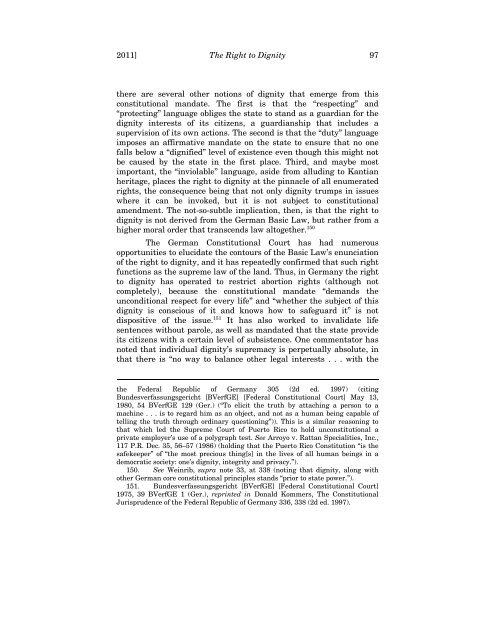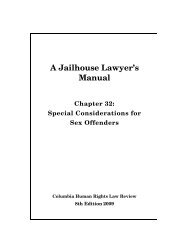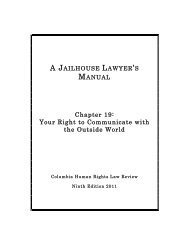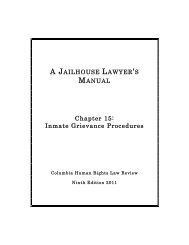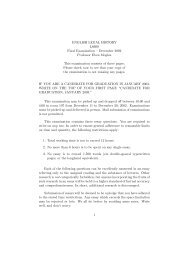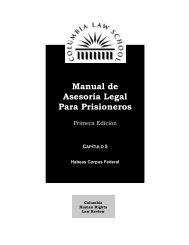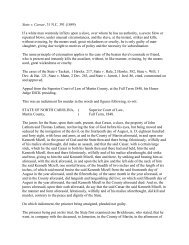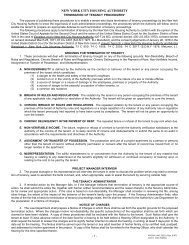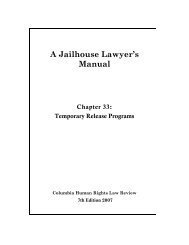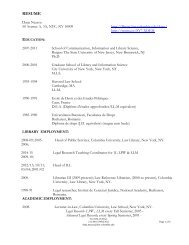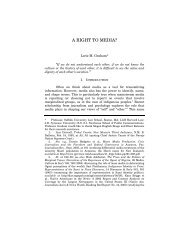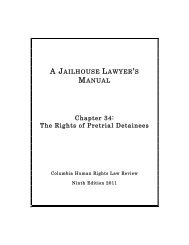The Right to Dignity Rex D. Glensy - Columbia Law School
The Right to Dignity Rex D. Glensy - Columbia Law School
The Right to Dignity Rex D. Glensy - Columbia Law School
Create successful ePaper yourself
Turn your PDF publications into a flip-book with our unique Google optimized e-Paper software.
2011] <strong>The</strong> <strong>Right</strong> <strong>to</strong> <strong>Dignity</strong> 97<br />
there are several other notions of dignity that emerge from this<br />
constitutional mandate. <strong>The</strong> first is that the “respecting” and<br />
“protecting” language obliges the state <strong>to</strong> stand as a guardian for the<br />
dignity interests of its citizens, a guardianship that includes a<br />
supervision of its own actions. <strong>The</strong> second is that the “duty” language<br />
imposes an affirmative mandate on the state <strong>to</strong> ensure that no one<br />
falls below a “dignified” level of existence even though this might not<br />
be caused by the state in the first place. Third, and maybe most<br />
important, the “inviolable” language, aside from alluding <strong>to</strong> Kantian<br />
heritage, places the right <strong>to</strong> dignity at the pinnacle of all enumerated<br />
rights, the consequence being that not only dignity trumps in issues<br />
where it can be invoked, but it is not subject <strong>to</strong> constitutional<br />
amendment. <strong>The</strong> notsosubtle implication, then, is that the right <strong>to</strong><br />
dignity is not derived from the German Basic <strong>Law</strong>, but rather from a<br />
higher moral order that transcends law al<strong>to</strong>gether. 150<br />
<strong>The</strong> German Constitutional Court has had numerous<br />
opportunities <strong>to</strong> elucidate the con<strong>to</strong>urs of the Basic <strong>Law</strong>’s enunciation<br />
of the right <strong>to</strong> dignity, and it has repeatedly confirmed that such right<br />
functions as the supreme law of the land. Thus, in Germany the right<br />
<strong>to</strong> dignity has operated <strong>to</strong> restrict abortion rights (although not<br />
completely), because the constitutional mandate “demands the<br />
unconditional respect for every life” and “whether the subject of this<br />
dignity is conscious of it and knows how <strong>to</strong> safeguard it” is not<br />
dispositive of the issue. 151 It has also worked <strong>to</strong> invalidate life<br />
sentences without parole, as well as mandated that the state provide<br />
its citizens with a certain level of subsistence. One commenta<strong>to</strong>r has<br />
noted that individual dignity’s supremacy is perpetually absolute, in<br />
that there is “no way <strong>to</strong> balance other legal interests . . . with the<br />
the Federal Republic of Germany 305 (2d ed. 1997) (citing<br />
Bundesverfassungsgericht [BVerfGE] [Federal Constitutional Court] May 13,<br />
1980, 54 BVerfGE 129 (Ger.) (“To elicit the truth by attaching a person <strong>to</strong> a<br />
machine . . . is <strong>to</strong> regard him as an object, and not as a human being capable of<br />
telling the truth through ordinary questioning”)). This is a similar reasoning <strong>to</strong><br />
that which led the Supreme Court of Puer<strong>to</strong> Rico <strong>to</strong> hold unconstitutional a<br />
private employer’s use of a polygraph test. See Arroyo v. Rattan Specialities, Inc.,<br />
117 P.R. Dec. 35, 56–57 (1986) (holding that the Puer<strong>to</strong> Rico Constitution “is the<br />
safekeeper” of “the most precious thing[s] in the lives of all human beings in a<br />
democratic society: one’s dignity, integrity and privacy.”).<br />
150. See Weinrib, supra note 33, at 338 (noting that dignity, along with<br />
other German core constitutional principles stands “prior <strong>to</strong> state power.”).<br />
151. Bundesverfassungsgericht [BVerfGE] [Federal Constitutional Court]<br />
1975, 39 BVerfGE 1 (Ger.), reprinted in Donald Kommers, <strong>The</strong> Constitutional<br />
Jurisprudence of the Federal Republic of Germany 336, 338 (2d ed. 1997).


